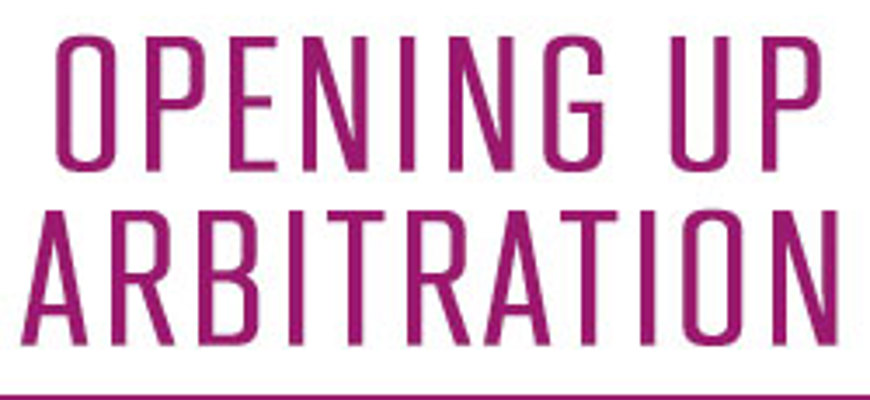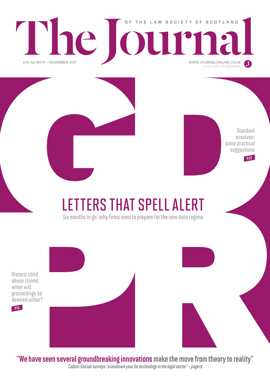Opening up arbitration

Prospects for women as arbitrators, and for Scotland as an international centre of arbitration, both featured in an all-female panel session at a breakfast seminar at the Scottish Arbitration Centre (SAC).
The event was held jointly with ArbitralWomen, which brings together women practitioners active in international dispute resolution. Since its origins in 1993, ArbitralWomen has grown to a network 1,000 strong, from more than 40 countries on all continents. Among its campaign tools is the Equal Representation in Arbitration Pledge, a call for the international arbitration community to commit to increase, on an equal opportunity basis, the number of women appointed as arbitrators, with the goal of full parity.
Even when women are nominated as possible arbitrators, they stand less chance of being chosen than men. Those present recognised that the issue is one of client as well as solicitor attitudes, but ArbitralWomen President Rashda Rana SC assured the meeting that the organisation was trying to educate and manage against such conscious or unconscious bias.
One issue that affects not only women is how to secure your first appointment. Scotland’s Lindy Patterson QC pointed out that parties are often unwilling to select someone with little experience of actually sitting as an arbitrator. In response to a suggestion of mentoring schemes, she expressed a personal view that while useful, they would not help you secure a first appointment.
Also from the floor came the observation that most women secure their first appointment through an arbitral institution – that is, when it is asked to nominate someone to act. (The SAC’s arbitral appointments committee has seven women and six men.) Another person suggested acting as an arbitral tribunal secretary as a gateway. Again, more women are now found as instructing solicitors and they can look for female as well as male candidates, and encourage more junior women to consider that career path.
Again from the floor, Angela Grahame QC, Vice Dean of the Faculty of Advocates, who has been instrumental in establishing the Faculty’s new personal injury arbitration service, suggested that if women can secure appointment to domestic arbitrations in their own field, practitioners might gain the confidence to appoint them more widely.
Taking on London
And what prospects does Scotland have of attracting more arbitration business? Patterson, who practises internationally as an arbitrator, pointed out that London has been very successful in promoting itself (supported by the judiciary) as an international arbitration centre, becoming one of the five most preferred seats globally along with Paris, Hong Kong, Singapore and Geneva. Its strengths are the neutrality and impartiality of the legal system, its arbitration law and its track record of enforcement.
Though sharing some of these, Scotland is “just starting out” by comparison, though judgments here have been supportive of the arbitration process and judges have avoided the different terminology that parties from elsewhere can find offputting. It can also boast a particular expertise in energy law.
Panellist Anne-Marie Blaney pointed to the position in Dublin, which like Scotland has a permanent arbitration centre. Irish judges have also been supportive, and as a forum Dublin has become established “to a high level in the international field”, though a limiting factor is the number of arbitrators available.
Philippa Charles, who hails from Dublin but practises in London, accused London of a certain complacency. It could show “a lack of willingness to accommodate a truly international set of parties”, in that cases were always conducted in the same way. Was there an opportunity here for Scotland (and Ireland) to be a bit more imaginative?
Cultural differences between jurisdictions can also cause misunderstanding. “There isn’t only one best practice,” Finland’s Carita Lindholm-Wallgren pointed out. Production of documents, obtaining witness statements, even the focus of the arbitration, are regarded differently in different parts of Europe.
With more jurisdictions seeking to become centres of arbitration, including the Caribbean and Eastern Europe, it seems appropriate to conclude with her comment: “The more there are, the more arbitration there will be.”
In this issue
- Immigration detention: a case of overuse
- Sexual harassment: don't suffer in silence
- Child disputes: a quicker way through?
- Brexit: where are we now and what happens next?
- Reading for pleasure
- Opinion: Claire McKee
- Book reviews
- Profile
- President's column
- ScotLIS: the citizens' tool
- People on the move
- People matter
- Historic abuse: the fairness matrix
- Landmark year in legal IT
- Sentence, but no full stop
- Opening up arbitration
- Making the agent pay
- Equal pay: beware the mass claims
- Dealing with conflict
- Claims outside the rules
- Pension transfers – history repeating itself?
- Last instructions
- Scottish Solicitors' Discipline Tribunal
- Standard missives: an unachievable dream?
- SOLAR powered
- Disability rights
- Law reform roundup
- Too hard a drive?
- Settlement: can you avoid cheques?
- Q & A corner
- When 25 is the new 35
- Sorry; not sorry
- Ask Ash
- Plan sets ambitious 2017-18 targets
- Letting agents: prepare to register
- Paralegal pointers
- A way to make an impact






